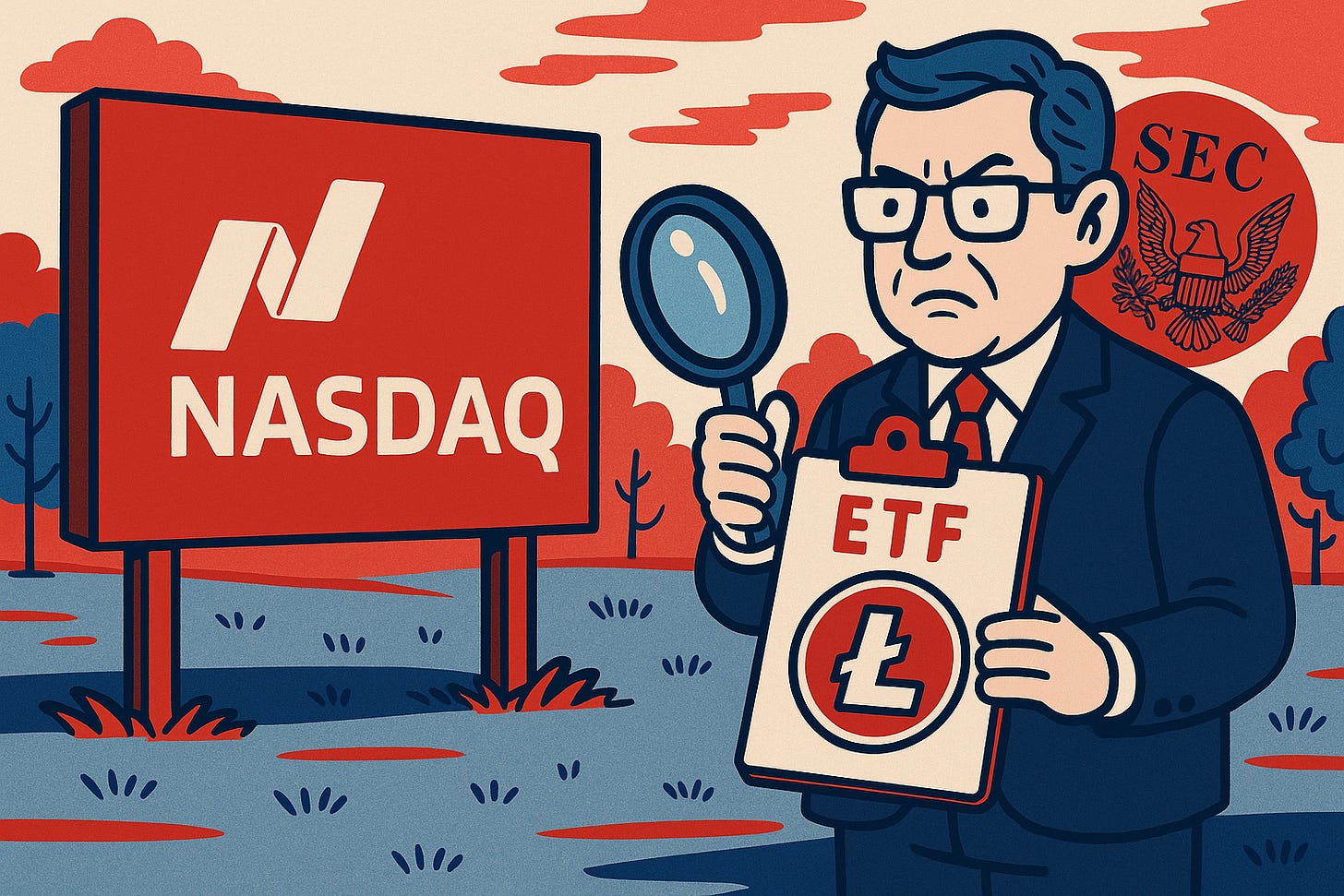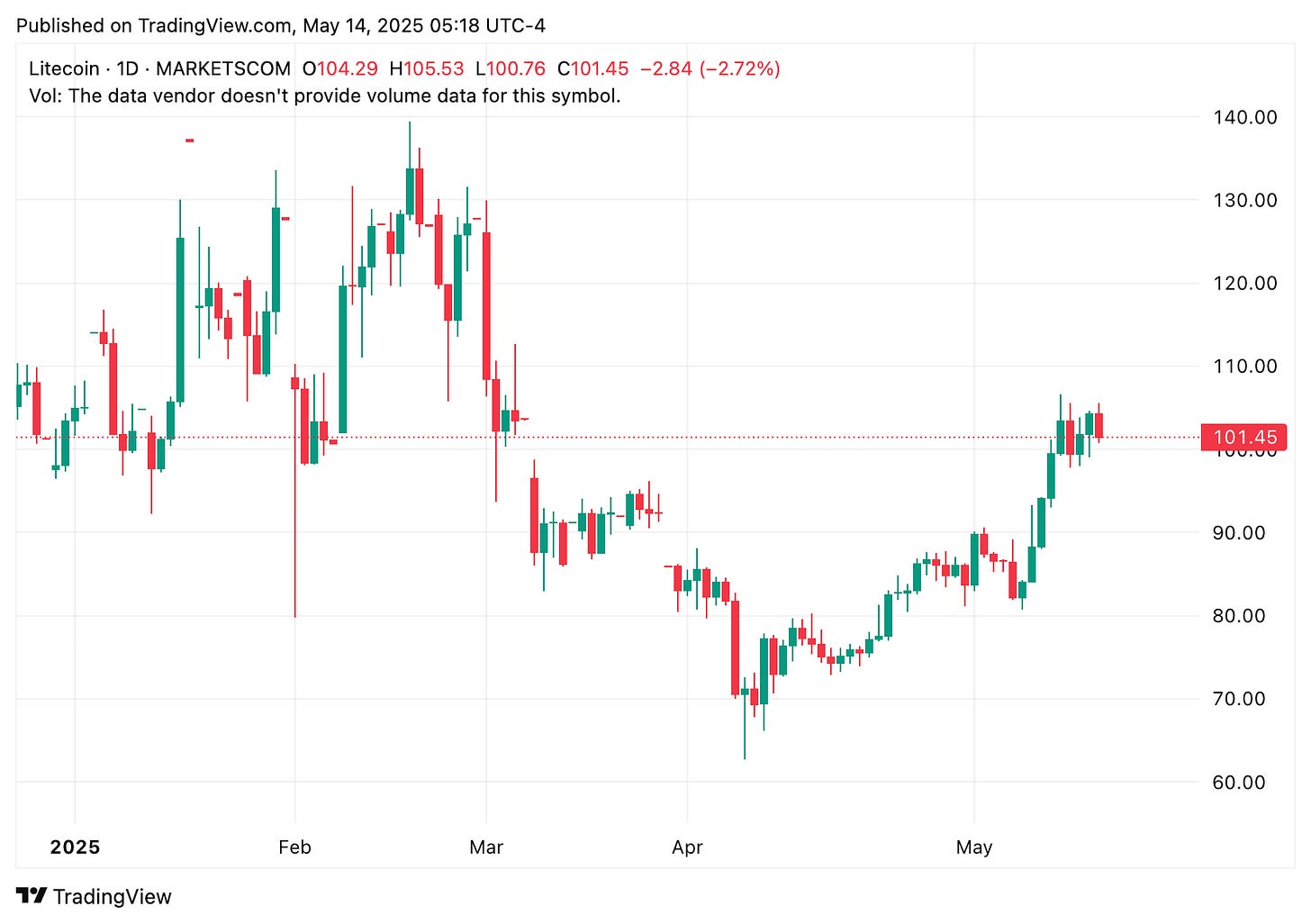SEC Investigates Nasdaq’s Proposed Canary Litecoin ETF For Its Legal Standards and Market Integrity
Newsletter Issue 22: The SEC is assessing Nasdaq’s attempt to list a Litecoin-based ETF, raising key legal questions about fraud prevention, market surveillance and investor protection.
The SEC is now reviewing whether to allow Nasdaq to list a Litecoin-based ETF backed by Litecoin. This development is a major test of how digital assets fit into existing securities law. This update breaks down what is being proposed, why it matters, and what legal hurdles stand in the way before you ever see “Canary Litecoin ETF” on your trading app.
Canary Litecoin ETF: The SEC Opens the Door, but Not Without Questions
📍Regulatory focus: United States Securities and Exchange Commission (SEC)
🔍 Filing Reference: SR–NASDAQ–2025–005
🇺🇸 Canary Litecoin ETF: The SEC Opens the Floor for Public Input
The United States Securities and Exchange Commission (SEC) has initiated formal proceedings to assess a proposed rule change filed by the Nasdaq Stock Market. The change seeks approval to list and trade shares of the Canary Litecoin ETF under Nasdaq Rule 5711(d), which governs commodity-based trust shares.
The proposal plans to offer investors exposure to Litecoin (LTC) through a regulated financial product, without requiring them to directly hold the digital asset. 📊
This approach demonstrates yet another attempt to align certain crypto assets with traditional securities markets, making them more accessible to institutional and retail investors alike.
The ETF structure has long been seen as a bridge between digital currencies and conventional finance. The proposed listing, if approved, would place Litecoin alongside other assets that have been packaged into ETFs for ease of trading on national securities exchanges.
However, the proposal enters a regulatory environment that remains cautious and highly protective of investor interests. The SEC has been deliberate in its reviews of crypto-related ETFs, often citing concerns around fraud, market manipulation, lack of oversight on global crypto exchanges, and investor protection. While Bitcoin ETFs have made some progress, similar applications for other crypto assets have faced greater legal scrutiny.
With this application, the SEC is not merely assessing the technical aspects of a new product. It is considering whether this ETF can meet its statutory duties under US securities law, particularly those that require exchanges to operate fairly and safeguard the integrity of the market.
If approved, this would mark a high-profile attempt to bring a Litecoin-based fund into mainstream financial products, supporting the wider legal framework to legitimise crypto assets in traditional capital markets. However, as with all things involving digital assets and regulatory scrutiny, this one is far from straightforward.
What Has Been Proposed?
In January 2025, Nasdaq filed a proposed rule change (SR–NASDAQ–2025–005) with the SEC under Section 19(b)(1) of the Securities Exchange Act of 1934.
The proposal is to list and trade shares of the Canary Litecoin ETF, a commodity-based trust fund that would give institutional and retail investors exposure to Litecoin (LTC) without requiring them to directly hold or secure the token.
The ETF would be structured as follows:
Its sole assets would be Litecoin and cash.
Its value would be tracked using the CoinDesk Litecoin Price Index (LTX).
Daily valuations would take place at 4:00 PM (New York time) based on a weighted price average from selected digital trading platforms.
The ETF would issue and redeem shares in blocks of 10,000 through authorised participants using cash.
BitGo Trust Company and Coinbase Custody Trust Company would act as custodians for the fund's Litecoin holdings.
The sponsor is Canary Capital Group LLC.
The listing would take place under Nasdaq Rule 5711(d), which governs commodity-based trust shares. This is the same category used to list other crypto-related products that track the price of digital commodities like Bitcoin.
The formal Notice of Proposed Rulemaking was published in the Federal Register on 4 February 2025. The SEC later extended the deadline for a final decision and has now opened a proceeding to gather more information and comments before deciding whether to approve or disapprove the proposal.
What the SEC Is Now Considering 📃
On 5 May 2025, the SEC issued an Order Instituting Proceedings to evaluate the Nasdaq proposal under Section 19(b)(2)(B) of the Securities Exchange Act. This signals that the Commission is not yet satisfied that all relevant legal criteria have been met.
It is worth clarifying what this move actually means. The institution of proceedings is not a rejection. Rather, it is a formal pause that allows the SEC to open the floor to public input, and to conduct a deeper legal analysis.
The key standard the SEC will use in its review is found in Section 6(b)(5) of the Securities Exchange Act. This section requires that the rules of a securities exchange be:
“Designed to prevent fraudulent and manipulative acts and practices, to promote just and equitable principles of trade, to foster cooperation and coordination with persons engaged in regulating, clearing, settling, processing information with respect to, and facilitating transactions in securities, to remove impediments to and perfect the mechanism of a free and open market and a national market system, and, in general, to protect investors and the public interest.”
This is the legal test the ETF must pass.
For now, the Commission has decided it wants more information before coming to a view. In doing so, it has issued a call for written comments from the public. These will form part of the official record used to evaluate the proposed ETF.
Legal Hurdles Still Facing Litecoin ETFs 🚧
Unlike Bitcoin, which has seen regulatory momentum in the direction of ETF approval, Litecoin has not enjoyed the same success in the regulatory arena. There are several specific legal challenges that may weigh heavily on the SEC’s review process.
1. Market Surveillance Concerns
A persistent concern raised by the SEC in prior crypto ETF applications involves the lack of sufficient market surveillance across crypto exchanges. Since Litecoin is traded on many global platforms with no consistent reporting or oversight, the SEC may be sceptical about whether it can detect and prevent fraud, manipulation, or price distortion.
Nasdaq will need to demonstrate that the underlying market for Litecoin is not vulnerable to manipulation, or that any such risks are mitigated by the fund’s structure and its reliance on a reliable index.
2. Index Reliability and Fair Pricing
The CoinDesk Litecoin Price Index will serve as the benchmark for the ETF’s valuation. This index aggregates price and volume data from several trading venues over a rolling 24-hour window. The methodology must be robust and immune from spoofing or wash trades that could artificially skew prices.
The SEC has previously flagged weaknesses in pricing methodologies that rely on unregulated or overseas exchanges, so scrutiny here will be intense.
3. Custody and Safekeeping
The involvement of regulated custodians like BitGo and Coinbase Custody gives the fund a strong starting point. These entities are already providing custody for other crypto funds and are registered as trust companies.
However, given the high-profile collapses and hacks that have plagued crypto custody in the past, the SEC may probe operational resilience, cyber protections, insurance, and asset segregation arrangements.
4. Investor Protection and Liquidity Risks
Even if the ETF itself is structured in a compliant way, the SEC must also be satisfied that it will not pose risks to retail or institutional investors. Questions may be raised about:
The volatility of Litecoin
How cash redemptions are handled during periods of extreme market stress
The transparency of fees and costs
The risk of price deviation between the ETF share price and the value of the underlying Litecoin assets
The Regulatory Timetable ⏳
As it stands, the SEC has until 30 May 2025 to receive public comments. Anyone interested can send written submissions, either by email or via the SEC’s public portal, referencing file number SR–NASDAQ–2025–005.
A rebuttal window will run until 13 June 2025, allowing parties to respond to comments submitted by others.
Once the comment window closes, the SEC will review all materials and reach a decision. It has full discretion to either approve, reject, or request further modifications. There is no firm timeline for when a final decision must be made, although the Commission will typically announce its decision within several months.
What to Watch for Next
While this is not the first attempt to launch a Litecoin ETF, it is certainly the most institutionally structured application to date. The involvement of major custodians and a formalised index will help Nasdaq’s case.
Still, the bar remains high.
The SEC will weigh the legal merits of the ETF proposal against its statutory obligations under the Securities Exchange Act.
The primary question is whether allowing the fund to be listed on Nasdaq will uphold the Exchange’s duty to prevent market manipulation and protect the public interest.
Public submissions during this window will be key. If credible market participants, academics, or institutional investors submit persuasive views supporting the proposal, that may influence the SEC’s internal deliberations.







Something I really appreciate about this proposed Litecoin fund is how stripped back it is. There’s no staking. No leverage. No derivatives. Just Litecoin stored securely with Coinbase Custody and BitGo, and priced using CoinDesk’s 24-hour Litecoin index. Everything about it is designed to avoid complications. That also makes it easier for regulators to evaluate, and for traditional investors to trust.